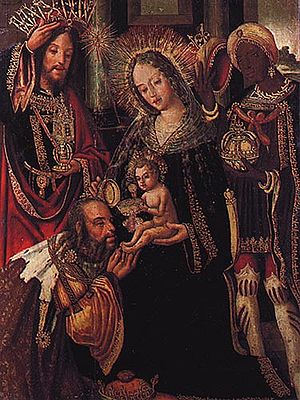Today, as I think of the spirit of gift-giving, I think of the three magi who visited Jesus as an infant and brought him gifts. The gifts perhaps seem small: frankincense, myrrh, and gold. In later tradition, the three wise men and the three gifts stand for the three continents: Africa, Europe, and Asia, as seen in this 15th century depiction. However, I have a different take on the gifts of the magi.
 |
| Adoração dos Magos by Vicente Gil |
I doubt that people reading the Gospel of Matthew at the time would have had this symbolic perspective of the men of all continents bowing down to the lord. Magi to a Persian would have meant a Zoroastrian priest. To a member of the world of Hellenism, it signified astrologers, alchemists, and magicians, as well as Zoroastrian priests. Many in the Hellenistic world considered Zarathustra himself to be the inventor of magic and astrology. The three wise men in the story certainly seem to be able to read the stars quite accurately. As the Hellenic world transitioned to the Roman, I'm not sure how or if these perspectives changed. I do know that Matthew is alone in interpreting magi as wise men: early church fathers including St. Jerome, St. Augustine, St. Justin, and Origen (who I have a special interest in), continue to refer to the three as magicians.
The word magi appears in ancient Greek sources from the moment Cyrus conquered Anatolia in 547 BCE, bringing the Persian empire to the Greek doorstep. Within a decade, Empedocles introduced the first dualism into Greece in the form of the gods Love (philia) and Hate (neikos). According to Empedocles, all natural processes are caused by the interplay of these forces. Is this his interpretation of Ahura Mazda and Angra Mainyu, the Zoroastrian gods of Light and Dark? (By the way, Aristotle's student Eudemus later translates these names into Greek as Oromasdes and
Areimanios.)
So here are the true gifts the magi brought to Christianity: first, the growing popularity of dualism in the Greek world, and then the Hellenistic and Roman. This clearly had an awesome impact on Christianity. But perhaps the Magi gave an even greater gift to the tradition that would come to celebrate Christmas: Zoroastrianism shifted the idea of the afterlife in the Near East, Middle East and Mediterranean basin away from a bleak, colorless subterranean affair to a blissful, heavenly life. The first Greek notions of the psyche rising to heaven after death occur in the 530's, just a decade after the Persian conquest of Anatolia. By the time Jesus walked this earth, people were well prepared by the magi to accept key components of his message.
No comments:
Post a Comment